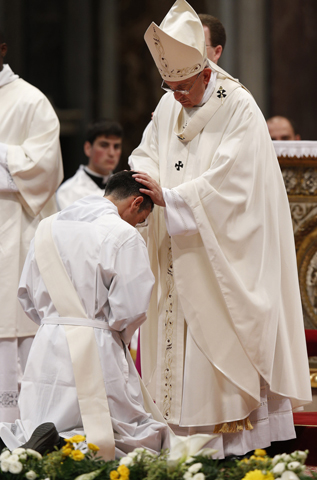
Pope Francis ordains a new priest April 26 in St. Peter's Basilica at the Vatican. (CNS/Paul Haring)
A few years ago, an American bishop who has since retired described the last ad limina visit he made to Rome while Pope John Paul II was still alive.
The Polish pope was already in an advanced stage of Parkinson's disease, and his energy level and motor skills were noticeably diminished.
The bishop arrived promptly for the 15-minute private meeting that John Paul religiously reserved for every diocesan ordinary during the once-every-five-years visit. But before being admitted to the papal study, an aide took the bishop aside and told him he'd have to do most of the talking. However, he was adamant that the aging and ailing pope was still perfectly alert and as mentally sharp as ever. The official again emphasized that it would be a full 15 minutes alone with the now-sainted pope.
The bishop was an old pro at ad limina visits. He had done this at least six or seven times before, having been appointed head of his diocese by Paul VI in the 1970s.
Still, he was a bit nervous.
The Vatican aide brought him to the old pope, who was seated in a white, box-like mobile chair; his head was slumped to his chest. The aide introduced the bishop to John Paul, who looked up and extended his hand to the visitor.
The aide nodded to the bishop, as to give him his cue, then left the room.
The bishop began to report on the state of the local church he had had the privilege to serve and lead for some three decades. He thought he had offered a fairly extensive overview when the pope lifted his head and exclaimed in a warbled voice, "Vocations!"
So the good bishop began to tell of the number and quality of young men from his diocese who were in the seminary, how many new priests he had ordained each of the past five years, and how the vocations office was working to ensure good candidates for ordained ministry.
The pope raised his slumped head and again cried out: "Vocations!"
The bishop began to sweat.
He spoke of the religious communities in the diocese and their mixed results in attracting new members. He then emphasized that a major focus of Catholic schools in his diocese, especially at the secondary level, was to teach young people that there were various Christian vocations and to help them discern whether they were called to marriage, priesthood or religious life.
The bishop was sure he had exhausted the topic, so he stopped.
But his heart nearly leapt into his mouth when, yet one more time, Pope John Paul blurted out, "Vocations!"
At that point, a buzzer went off, the papal aide came into the room and the bishop's 15 minutes with the pope were over.
The story, both humorous and horrifying, came to mind again several days ago as we began preparing for Pope Francis' visit this week to Latin America. Like most other parts of the world, this vast region, home to more than 40 percent of all the world's Catholics, has a worrying shortage of ordained presbyters required for validly celebrating the sacraments, the lifeblood of Catholic Christianity.
The most recent Statistical Yearbook of the Church, which the Vatican published a few months ago, charts a steady decline in the ordination of diocesan priests in Latin America between 2008 and 2013. While such ordinations in the United States have increased ever so slightly over the same period of time, the numbers have been not even close to sufficiently replace priests who have died, retired or left the active ministry, especially as the church has added millions of new members over the past several years.
Will Pope Francis address the vocations problem during his visit to Ecuador, Bolivia and Paraguay? Most of the secular and faith-based media have so far been more interested in fleshing out the perhaps more enticing narrative of the "pope of the poor" taking his message to those on the margins in Latin America, especially the indigenous population. And this is good.
But the vocations shortage has become an acute crisis almost everywhere except, perhaps, in Africa. But the situation is uneven there, too.
The Argentine pope knows there is a serious problem, yet he has insisted that even worse than ordaining too few priests is ordaining bad ones. On a number of occasions, he has criticized bishops and religious communities for accepting candidates who are unbalanced or have been "expelled from other seminaries" and then trying to justify this irresponsible decision under the guise that "they need priests."
It has long been argued, especially in the pages of NCR, that there is no lack of talented, dedicated and holy candidates that God is calling forth to serve the People of God in the ordained ministry. The problem is that the criteria the Catholic hierarchy has for selecting future priests ("only celibate males need apply") eliminates so many of the best candidates.
A bishop from Brazil has gone on record as saying that Pope Francis, apparently like Paul VI before him, would be open to ordaining married men if the bishops' conference of a particular country or international region were to endorse such a plan. But not many bishops over the past 25 years or so have spoken out publicly in favor of married priests; certainly not the ambitious among them, since they knew that if they did so in the previous two pontificates, they could kiss any possibility of career advancement goodbye.
The election of Francis, however, has instilled a bit of courage and a greater sense of prophetic freedom among some of them. Bishop Crispian Hollis of England, for example, just last week published a letter in The Tablet of London, calling for married priests: "This is surely the logical step forward and I find this increasingly to be the 'mind of the Church', at least in those parishes where I am pastorally engaged." Unfortunately, he retired as bishop of Portsmouth three years ago and is now living in another diocese.
A handful of bishops still heading dioceses have also spoken up for the ordination of married men. But there are far too few of them.
And the persistent refrain out of the Vatican to "pray for vocations" is no longer a viable response to the shortage of priests -- either in quantity or in quality. For every new novena or eucharistic adoration scheme launched to stimulate vocations, two or 10 more parishes are being closed or merged.
Neither is importing priests from foreign countries a solution, yet that seems to be the one so many bishops are opting for with increasing urgency. A least two bishops in Scotland recently invited the Heralds of Good News, a society of apostolic life from Southern India, to take over parishes in their dioceses. The society was founded in 1984 to promote priestly vocations and train seminarians. They are already present in seven U.S. dioceses.
Bishop William Nolan of Galloway said they needed the Heralds and priests from other "Third World countries" because Scotland, which embraced Christianity at least as early as the fifth century, is "now a mission country."
"The people who are coming here [from that part of the world] are the ones whose faith and devotion will sustain us," said Bishop Stephen Robson of Dunkeld.
What he really meant -- and what bishops from all over the world who are bringing in foreign priests to their dioceses mean, too -- is that these "missionaries" will sustain the bishops who embrace the status quo concerning ministries in the church.
Meanwhile, the voice of the saint echoes, "Vocations!"
[Robert Mickens is editor-in-chief of Global Pulse. Since 1986, he has lived in Rome, where he studied theology at the Pontifical Gregorian University before working 11 years at Vatican Radio and then another decade as correspondent for The Tablet of London.]
Editor's note: We can send you an email alert every time Robert Mickens' column, A Roman Observer, is posted. Go to this page and follow directions: Email alert sign-up.


